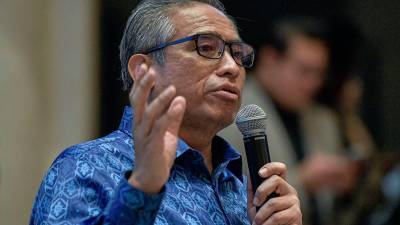SEPANG: Chief Secretary to the Government (KSN) Tan Sri Shamsul Azri Abu Bakar has proposed that all research resolutions presented at the National Governance, Integrity and Anti-Corruption Research Conference since its inception in 2022 be compiled and published in a single volume.
The suggestion was shared by Malaysian Anti-Corruption Commission (MACC) Chief Commissioner Tan Sri Azam Baki at the closing ceremony of the fourth edition of the conference today.
“During our discussion after attending the conference yesterday, the Chief Secretary proposed a great idea that resolutions from all four editions of the conference should be compiled into one volume.
“This would be a very valuable document that should be registered and preserved not only as a reference for civil servants and policymakers but also as essential reading material for the public and as an archival resource for the nation,” he said.
Azam noted that this initiative would help ensure the research findings and recommendations are fully utilised to strengthen the country’s governance framework.
Shamsul has proposed compiling governance recommendations from the National Governance, Integrity and Anti-Corruption Conference.
Associate Professor Dr Muhammad Faris Abdullah from the International Islamic University Malaysia presented resolutions recommending the re-establishment of the Special Task Force to combat illegal immigration.
He stated that reinstating the task force would enhance readiness at border checkpoints through high-tech facilities and appropriate incentives to reinforce national security controls.
This proposal was among 11 resolutions presented at the fourth edition of the conference which concluded today.
These resolutions will be submitted to the Malaysian Anti-Corruption Commission as inputs to reinforce Malaysia’s governance, integrity, and anti-corruption agenda.
Other resolutions include introducing a real-time waste tracking system nationwide to curb illegal waste management.
The conference also recommended enacting new legislation to regulate e-sports at the national level and strengthening the legal framework through the implementation of community policing.
Additional recommendations called for empowering professional bodies in the built environment sector with compliance audits and a demerit system.
The resolutions also proposed enhancing tourism industry licensing through digitalisation for greater efficiency and transparency.
Other key proposals encompass raising policymakers’ awareness of blue carbon trading risks with a more integrated regulatory framework.
The conference recommended employing Implicit Association Tests and Assertiveness-Based Approaches to evaluate the effectiveness of the Governance, Integrity and Anti-Corruption Enhancement Module.
Developing comprehensive training modules tailored for the manufacturing sector was also among the resolutions presented.
Furthermore, resolutions addressed efforts to strengthen the integration of automation technology, integrated audits, and transparent monitoring systems within the oil and gas sector. – Bernama
